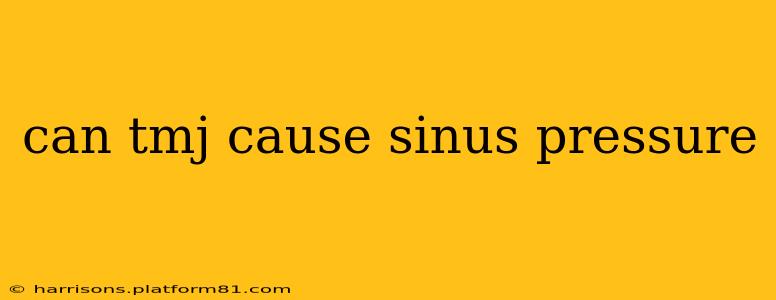Temporomandibular joint (TMJ) disorders can cause a surprising array of symptoms, and sinus pressure is one of them. While not directly related, the intricate network of nerves and muscles in the head and face means that problems in one area can often impact others. This article explores the connection between TMJ and sinus pressure, helping you understand the possible links and what you can do if you're experiencing both.
How Can TMJ Affect My Sinuses?
The key to understanding the link lies in the close proximity of the TMJ and the sinuses. The temporomandibular joint is located just in front of the ears, while the sinuses are air-filled cavities within the bones of the skull. These areas are interconnected through a complex system of muscles, nerves, and blood vessels. Problems with the TMJ can trigger a chain reaction that affects the sinuses.
One primary mechanism is muscle tension. When TMJ dysfunction causes muscle spasms or tightness in the jaw, neck, and facial muscles, it can indirectly put pressure on the sinuses. This tension can restrict blood flow and lymphatic drainage, potentially leading to inflammation and the sensation of sinus pressure or congestion.
Additionally, the referral of pain from the TMJ to the sinuses is a common occurrence. The trigeminal nerve, which innervates the face, jaw, and sinuses, is also closely associated with the TMJ. Pain signals originating from the TMJ can be misinterpreted by the brain as originating from the sinuses, leading to the experience of sinus pressure even without a true sinus infection.
What Are the Symptoms of TMJ-Related Sinus Pressure?
Experiencing sinus pressure alongside other TMJ symptoms is a key indicator of a potential connection. These accompanying symptoms might include:
- Jaw pain: Pain in the jaw, especially when chewing or opening your mouth wide.
- Headaches: Frequent headaches, particularly those concentrated around the temples or forehead.
- Earaches: Pain or fullness in the ears.
- Facial pain: Pain or pressure in the face, cheeks, or temples.
- Clicking or popping in the jaw: Noticeable sounds when opening or closing your mouth.
- Limited jaw movement: Difficulty opening your mouth fully or chewing comfortably.
- Neck pain: Stiffness or pain in the neck and shoulders.
Can Sinus Infections Cause TMJ Pain?
While less common than TMJ causing sinus pressure symptoms, a severe sinus infection can sometimes exacerbate TMJ pain. The inflammation and pressure from the infection might put additional strain on the already sensitive TMJ, leading to increased discomfort. However, it's crucial to distinguish between primary TMJ issues and secondary aggravation from a sinus infection.
How Can I Tell If My Sinus Pressure is Due to TMJ?
Determining whether sinus pressure stems from TMJ dysfunction requires a professional assessment. A doctor or dentist specializing in TMJ disorders can conduct a thorough examination, assess your symptoms, and rule out other potential causes like true sinus infections or allergies. Imaging techniques, such as X-rays or MRI scans, may be used to evaluate the TMJ and surrounding structures.
What Treatments Are Available for TMJ-Related Sinus Pressure?
Treatment for TMJ-related sinus pressure focuses on managing the underlying TMJ disorder. Common approaches include:
- Over-the-counter pain relievers: Medications like ibuprofen or acetaminophen can help manage pain and inflammation.
- Muscle relaxants: These medications can help alleviate muscle spasms and tightness.
- Physical therapy: Exercises and stretches can help strengthen jaw muscles and improve range of motion.
- Splints or mouthguards: These devices can help reposition the jaw and reduce strain on the TMJ.
- Stress management techniques: Stress can exacerbate TMJ symptoms, so techniques like yoga or meditation can be beneficial.
When Should I Seek Professional Help?
If you're experiencing persistent sinus pressure accompanied by any of the aforementioned TMJ symptoms, it's crucial to seek professional medical advice. Early intervention can prevent the condition from worsening and help alleviate discomfort.
This information is intended for educational purposes only and should not be considered medical advice. Always consult with a healthcare professional for diagnosis and treatment of any medical condition.
